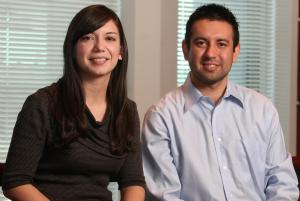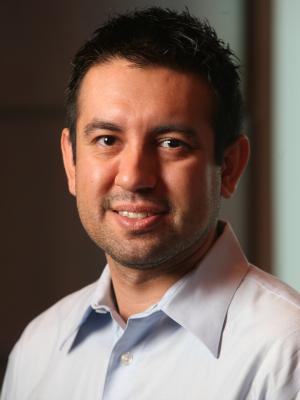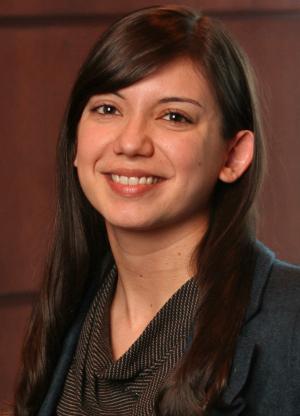Two Columbia Law School Students Receive Prestigious Skadden Fellowship
Liliana Zaragoza '13 will work to aid domestic workers in New York; Oscar Lopez '13 will battle 'zero tolerance' school discipline policies
New York, February 5, 2013— Two Columbia Law School students with a deep commitment to public interest law have been granted a rare opportunity to pursue their passion following graduation. Liliana (Lily) Zaragoza ’13 and Oscar Lopez ’13 have been awarded two-year Skadden Fellowships.
|
| Lily Zaragoza '13 and Oscar Lopez '13 |
Lopez, 25, and Zaragoza, 24, are among a select group of graduating law students and judicial clerks selected for this year’s prestigious Skadden Fellowship for their commitment to providing legal services to the poor.
The students’ desire to use their legal education for public service was forged through personal experience. Lopez learned the value of a good education when his mother fought for him to attend a better public high school in Los Angeles. That’s one reason why he has decided to devote his time to researching alternatives to exclusionary school discipline policies like suspension and expulsion. Zaragoza, whose mother initially worked as a caretaker for an elderly woman after emigrating from Mexico, will advocate for the rights of immigrant domestic workers in New York City during the course of her fellowship.
Both students are thrilled at the opportunity.
“It feels really great to know I’ll be doing what I love,” Zaragoza said.
Lopez agreed.
“I knew what I wanted to do,” he said. “I just needed the opportunity.”
The pair knew early in their academic careers that they wanted to work in public interest law.
Oscar Lopez ’13
|
| Oscar Lopez '13 |
After attending a community college for two years, Lopez went on to study psychology, education, civic engagement, and Chicano studies at the University of California, Los Angeles before entering Columbia Law School. Some of his friends and relatives didn’t fare so well. They ended up in gangs, incarcerated, or in jobs with little upward mobility. As a Skadden Fellow at the Advancement Project in Washington, D.C., Lopez will try to reduce educators’ reliance on so-called “zero tolerance” policies, part of a broader effort to keep kids in school, off the streets, and out of the criminal justice system.
“Oscar is amazing,” said Susan P. Sturm, George M. Jaffin Professor of Law and Social Responsibility. “He is one of those people who has public service in his bones, and will be a transformative leader in whatever community he is in.”
Lopez worked in Los Angeles at a community center and as a teaching assistant before coming to the Law School. He said suspensions and expulsions should be reserved for the most extreme behavior, not minor infractions like dress code violations.
“Part of my bigger goal is to make sure every student has a high quality education,” he said. “Zero tolerance policies are a barrier to that.”
Lily Zaragoza ’13
|
| Lily Zaragoza '13 |
Zaragoza’s Skadden Fellowship also mirrors her personal and professional experience. The Columbia Law Review editor-in-chief grew up in Tucson, Ariz., a progressive community that she said didn’t think twice about supporting its sizeable immigrant population.
“I remember going to marches on a whim,” she said. “I didn’t think much about it because it just was a part of Tucson culture.”
Later, as an international studies and human rights student at The University of Chicago, she decided she wanted to work as an advocate for immigrants.
“It was pretty clear to me that something that was part of my everyday life back in Tucson was actually what I wanted to do,” she said.
At the New York Legal Assistance Group, Zaragoza will coordinate outreach to thousands of domestic workers in New York City, educating them about the 2010 New York Domestic Workers’ Bill of Rights.
She said domestic workers are largely “hidden in the shadows” because they often work in family homes and are paid under the table. If the workers don’t come to her training sessions, Zaragoza said she would reach out to them at playgrounds and supermarkets around the city.
It wouldn’t be the first time she has immersed herself in such an effort. In the past, she worked as an intern at LatinoJustice PRLDEF, often meeting late at night with restaurant workers in Flushing, Queens to speak about possible employment violations after their shifts ended.
Zaragoza's "varied experiences in providing legal assistance to immigrants and low-wage workers provided her with relevant understanding of the struggles that immigrants face," said Rose Cuison Villazor, a professor at the University of California at Davis School of Law who had Zaragoza as a student when she was a visiting professor at Columbia Law School. "She is not only committed to using the law to improving the lives of poor people, but she is also brilliant, hardworking and passionate."
Both Lopez and Zaragoza have been deeply involved in the intellectual life of the Law School. In addition to serving as editor of the Columbia Law Review, Zaragoza was a student in the Immigration Defense Externship and director of the law school’s Society for Immigrant and Refugee Rights. Lopez, meanwhile, started the Columbia Law School chapter of the Latino/a Law Students Association Moot Court, taught in the High School Law Institute, and participated in the Challenging the Consequences of Mass Incarceration Clinic.
The Skadden Fellowship Program, established in 1988 by Skadden, Arps, Slate, Meagher & Flom, pays each student’s salary and benefits at a sponsoring organization.


